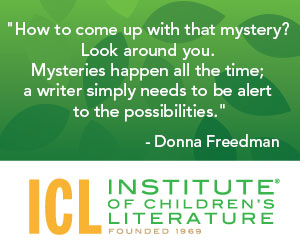1000 N. West Street #1200, Wilmington, DE 19801
© 2024 Direct Learning Systems, Inc. All rights reserved.

We teach our students how to write and get published!
View our Course Catalog >
One question that successful writers are often asked is “Where do you get your ideas?” That happens especially to genre writers who often deal with plots that aren’t exactly reflective of the life we all life. Most of us are never going to live in space, meet a dragon, or solve a murder, but our characters might, and that means we need to come up with ideas for how to accomplish these things. This is especially true if you write many books in the same genre.
I’ve written dozens of mysteries, and yet I still have many more ahead of me that will be written. But how do I avoid writing the same book over and over? How do I come up with new ideas? And how will you? Coming up with ideas for mysteries are often quite specific for each writer’s process, and ideas can come from many different directions, so we’re going to look as some of the ways ideas spring up so that you can try them for your own writing.
Many writers begin by coming up with a strong main character and once that character begins to become real for the writer, ideas for a mystery for that person to solve begin popping up. Imagine a character who never saw a book he didn’t love. A mystery for him might pop up because of something he found in an old book purchased from a thrift shop, used book store, or yard sale. Maybe he finds a treasure map, or a note begging for help, or a very old letter that reveals a crime.

If you aren’t really someone who comes up with the character first, and prefer to find the mystery in another way, the setting can be an excellent idea source. For example, many adult cozy mysteries are very much setting oriented. Bookshop mysteries, coffee shop mysteries, tea shop mysteries, and bakery mysteries are all very popular.
And these kinds of settings can all work for young adult mysteries (where the character might have a summer job or an after school job in such a setting) or even for middle grade (if the business belongs to the parents and the child helps out there), so they can be a great starting point for a kidlit mystery as well as a mystery for adult. Shops put a character in contact with unusual people, any of which might have a secret that they reveal inadvertently to the main character. Other shop plots might deal with theft, break-ins, or even unexplained creepiness (like products that move at night or strange sounds). And remodeling or repairs in a shop can reveal all sorts of things in the walls.
But shops are only one option. There are many setting choices that are much more specific to the lives of kids and teens. For instance, a camp mystery can involve someone stealing from cabins, or the disappearance of a camper, or a monster in the woods. But if you set your mystery at a birthday party, totally different possibilities come to mind: a mysterious gift, the disappearance of a guest, or the disappearance of a gift. A sleepover mystery might involve the question of why one person at the sleepover is distressed, or could involve a disappearance or something scary outside.
Consider making a list of possible settings and then brainstorm at least three mystery possibilities for every setting. What mystery might happen on a trip to the public library? What mystery might happen while camping with family or while visiting a museum or a farm? Even if you don’t use any of the ideas for a specific setting, the brainstorming process will strengthen your idea-generating muscles.
Some people want an idea or a premise before they ever begin. To do this, you often need a rather serendipitous idea, and those aren’t generated, they’re found. Newspaper stories, science articles, conversations with friends, and even dreams have prompted excellent mystery ideas. If you’ve spent time strengthening your idea muscles through brainstorming sessions, you’ll find yourself much quicker to find ideas in unexpected places.
However, these serendipitous idea moments are often unplanned and come when you’re not thinking about writing at all. So it’s a good idea to always carry a notetaking method around with you. I like paper and pencil, but I know many authors who take notes on their phones in these situations to keep the idea from slipping away.
Sometimes the situation of “needing a mystery idea right now” can feel like a hindrance to free and easy idea generation. The stress of needing an idea can block your ability to find one. In situations like this, there are options. Try entering “mystery writers get ideas” in a search engine. When I did this, it brought back ten different mystery writing prompt sites, so if you’re feeling stuck, there’s help out there for you in the form of prompts. Even if none of the prompts themselves are a good fit, often reading through these sorts of things help jump start your own idea generator, and you’ll come up with an idea of your own.
Another way to get the idea generating engine kick started would be reading mystery novel blurbs. Again, you don’t want to simply copy the blurbs you’re reading. Instead, wading through lots of blurbs will often get your brain into “create” mode, and you’ll begin coming up with ideas of your own. Just by reading prompts, you can often crack open the idea block and get things going again. So the answer to where a writer gets ideas is everywhere. It’s all in how you approach the search. Keep trying different things and you’ll find the method that works best, and most consistently for you.
Happy Hunting!
With over 100 books in publication, Jan Fields writes both chapter books for children and mystery novels for adults. She’s also known for a variety of experiences teaching writing, from one session SCBWI events to lengthier Highlights Foundation workshops to these blog posts for the Institute of Children’s Literature. As a former ICL instructor, Jan enjoys equipping writers for success in whatever way she can.
1000 N. West Street #1200, Wilmington, DE 19801
© 2024 Direct Learning Systems, Inc. All rights reserved.
1000 N. West Street #1200, Wilmington, DE 19801
© 2024 Direct Learning Systems, Inc. All rights reserved.
1000 N. West Street #1200, Wilmington, DE 19801
© 2024 Direct Learning Systems, Inc. All rights reserved.
1000 N. West Street #1200, Wilmington, DE 19801
© 2025 Direct Learning Systems, Inc. All rights reserved.
1000 N. West Street #1200, Wilmington, DE 19801
©2025 Direct Learning Systems, Inc. All rights reserved. Privacy Policy.
1 Comment